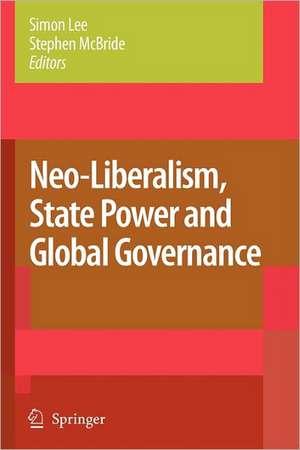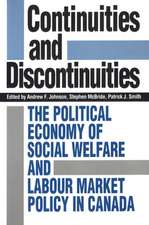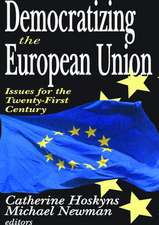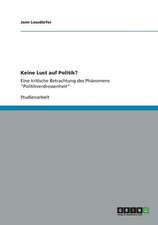Neo-Liberalism, State Power and Global Governance
Editat de Simon Lee, Stephen McBrideen Limba Engleză Paperback – 19 oct 2010
| Toate formatele și edițiile | Preț | Express |
|---|---|---|
| Paperback (1) | 639.73 lei 6-8 săpt. | |
| SPRINGER NETHERLANDS – 19 oct 2010 | 639.73 lei 6-8 săpt. | |
| Hardback (1) | 567.82 lei 3-5 săpt. | +24.43 lei 6-10 zile |
| SPRINGER NETHERLANDS – 4 sep 2007 | 567.82 lei 3-5 săpt. | +24.43 lei 6-10 zile |
Preț: 639.73 lei
Preț vechi: 752.63 lei
-15% Nou
Puncte Express: 960
Preț estimativ în valută:
122.41€ • 133.39$ • 103.15£
122.41€ • 133.39$ • 103.15£
Carte tipărită la comandă
Livrare economică 23 aprilie-07 mai
Preluare comenzi: 021 569.72.76
Specificații
ISBN-13: 9789048175710
ISBN-10: 9048175712
Pagini: 284
Ilustrații: XII, 270 p.
Dimensiuni: 155 x 235 x 15 mm
Greutate: 0.4 kg
Ediția:Softcover reprint of hardcover 1st ed. 2007
Editura: SPRINGER NETHERLANDS
Colecția Springer
Locul publicării:Dordrecht, Netherlands
ISBN-10: 9048175712
Pagini: 284
Ilustrații: XII, 270 p.
Dimensiuni: 155 x 235 x 15 mm
Greutate: 0.4 kg
Ediția:Softcover reprint of hardcover 1st ed. 2007
Editura: SPRINGER NETHERLANDS
Colecția Springer
Locul publicării:Dordrecht, Netherlands
Public țintă
ResearchCuprins
National Differences in the Face of Pressures to Converge.- Introduction: Neo-Liberalism, State Power and Global Governance in the Twenty-First Century.- European Economic Integration: The Threat to Modell Deutschland.- Stranded on the Common Ground?: Global Governance and State Power in England and Canada.- Assessing the Globalization–Decentralization Nexus: Patterns of Education and Reform in Mexico, Chile, Argentina and Nicaragua.- Trans-National Policy Prescriptions.- Tracking Neo-Liberalism: Labour Market Policies in the OECD Area.- Social Economy Policies as Flanking Mechanisms for Neo-Liberalism: Trans-national Policy Solutions, Emergent Contradictions, Local Alternatives.- Assessing the Convergence Thesis of Legal Reforms in Emerging Market Economies.- Labour: A Special Case in the Global Economy?.- Governance, Trade and Labour Mobility.- Neo-Liberal Policies and Immigrant Women in Canada.- The Need for Reform.- The Logic of Neo-Liberalism and the Political Economy of Consumer Debt-Led Growth.- World Trade and World Money: The Case for a New World Currency Unit.- Multilateral Institution-Building in a Neo-Liberal Era: The Case of Competition Policy.- The World Trade Organization and Global Governance.- Human Welfare and the Future of the World Trade Organization: Rethinking the International Institutional Architecture.- The Organization for Economic Co-operation and Development: Meeting the Challenges of the Twenty-First Century?.- Conclusion: The Need to Rebuild the Public Domain.
Textul de pe ultima copertă
The volume explores the relationship between neo-liberalism, state power and global governance. It seeks to show how neo-liberalism has failed to deliver a framework for state power and global governance capable of delivering stability and enduring prosperity. It also contends that the role of politics in general, and the state and global governance in particular, should be defined more broadly than the simple neo-liberal construction of institutions for the market.
Part One explores the pattern of national differences in the exercise of state power in a variety of industrialized and developing economies, despite the pressure to converge towards the dominant neo-liberal paradigm. Part Two analyses a variety of trans-national policy prescriptions for neo-liberalism and state power. Part Three explores whether the governance of labour markets is a special case in the global economy. Part Four sets out the need for institutional reform of the neo-liberal order in trade and finance. The volume concludes that there is the prospect of a more plural approach to state power and global governance, and one that recognizes the importance of the public domain of citizenship for delivering the global public goods of security, prosperity and environmental sustainability in the twenty-first century.
Part One explores the pattern of national differences in the exercise of state power in a variety of industrialized and developing economies, despite the pressure to converge towards the dominant neo-liberal paradigm. Part Two analyses a variety of trans-national policy prescriptions for neo-liberalism and state power. Part Three explores whether the governance of labour markets is a special case in the global economy. Part Four sets out the need for institutional reform of the neo-liberal order in trade and finance. The volume concludes that there is the prospect of a more plural approach to state power and global governance, and one that recognizes the importance of the public domain of citizenship for delivering the global public goods of security, prosperity and environmental sustainability in the twenty-first century.
Caracteristici
Provides in a single volume an evaluation of neo-liberalism as a basis for state power Provides in a single volume an evaluation of neo-liberalism as a basis for global governance Provides concise case studies of North American, European and emergent market economies
























